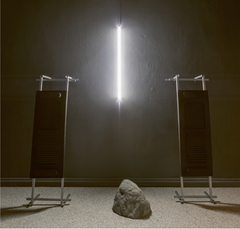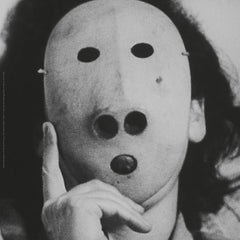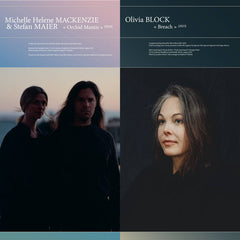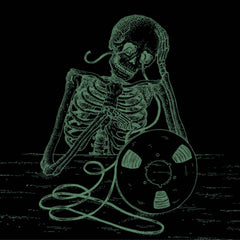Nicholas Bussmann, Werner Dafeldecker // Monte Carlo Fallacy 12"
- Availability:
ドイツ・ベルリンのチェロ奏者Nicholas Bussmannと、オーストリア・ウィーンのコントラバス奏者Werner Dafeldeckerが、2023年3月にルクセンブルクの実験/コンテンポラリーレーベルNI VU NI CONNUから300部限定でリリースした共作レコードです。
メロディ皆無のハードコア・ミニマル物音ドローン2曲を収録。インサートとDLコード付属。
以下、ニュージーランドのマルチ奏者Dean M. Robertsによる解説です。
"2020年初頭の封鎖で、ベルリンは静寂に包まれました。Nicholas Bussmann,は「東ベルリンの90年代初頭のようだった」と振り返るように、彼が育ち、社会の変化と不確実性を経験した場所であり、おそらく多くの空虚で静かな空間が広がっています。
長年のパートナーであるWerner Dafeldeckerとのデュオでは、2人の楽器奏者がそれぞれの楽器の性質を探求しながら、テンポよく思慮深い指導を受け、介入や名人芸をあからさまに示すことなく、その音を聞くことができます。パブロ・カザルスは、「their 楽器の周りに空気を入れなさい」と生徒に指示したことで有名です。
楽器は、「音楽」を生み出すという義務から解放され、剥き出しにされます。軋むような響きが、フェリーニの『オーケストラ・リハーサル』(1978年)に蔓延する悲劇の雰囲気を思い起こさせます。音と社会の境界線が曖昧になり、音楽という媒体が作曲演奏の難問のメタファーとなる中で、絶望と目的への疑問のシナリオを通して心理劇が展開されます。
音楽の塵が降り積もったとき、残るのは表面の音、擦り傷、軋み、擦り傷です。2人の演奏家は、既成の物語や政治を支持する義務から解放され、互いに新しい空気を教え合いながら、音の触覚的な再学習に取り組んでいます。何世紀もの間、ヴィオロンチェロとコントラバスは、歴史的な大交響曲や必死のジャズ演奏をするために、遠く離れた場所まで連れて行かれ、肉体的緊張と精神的ストレスに耐えてきたと想像してください。そして2020年、世界的な大流行によって無期限の休養に入った彼らは、眠れる巨人のようにケースから出され、飼育員によって埃を払われ、手入れをされることになります。
近年、DafeldeckerとBussmannは、音楽というメディア、そしてある程度は音作りのプロセスの意味や目的に対する不安を批判的かつ詮索的に考察する作品で名を馳せています-実践としての研究、それ自体が言語となる研究としての実践です。このプロジェクトは、古典的な楽器編成やアンサンブルの限界に疑問を投げかけ、拡張されたテクニックを試すことで、形式音楽のぎりぎりのところを引っ掻き回すことを目的とするコンソーシアムです。Bussmannは、近年、『ニュース三部作/AI環境における革命の歌』のように、一般参加型の声楽アンサンブル・パフォーマンス作品に着手しています。その理由は、即興音楽が彼の言う「ある種の音響的ドレスコード」に偏っていると感じ、疑問を抱くようになったからです。Bussmannが言うように、アルゴリズムは、まったく異なる背景を持つ音楽家が一緒に音楽を作るための枠組みを提供することができます。
その他のアルゴリズムに基づく作品には、ロボットピアノのためのパフォーマンスやインスタレーション、そしてマーティン・ブランドルマイヤーと結成したデュオ「Kapital Band 1」というプロジェクトでの継続的な活動があります。3枚目のアルバム『Internationale Solidarität』(Ni-Vu-Ni-Connuからリリース)では、機械との即興演奏の可能性、機械構造と人間のパターンの並列存在と模倣的肯定、衝動と論理の間の探求、プロセスの不可欠な部分として間違いを受け入れることを探求しています。
『Monte Carlo Fallacy』の音楽の背景には、部屋の音、街の天候の変化、演奏者の呼吸、Bussmannのグランプリ・スタジオの床に響く足音など、微妙なノイズのキャンバスがあります。これらは、テクノロジーやポストプロダクションに邪魔されない、ライブ音楽のリアルタイムかつハイファイな完全性をレコーディングに吹き込んでいます。これは、共鳴する弦楽器にできることを詩的に示すもので、それ以上でも以下でもありません。ハーレイ・ゲイバーの弦楽四重奏曲は、彼の冬のログハウスという牧歌的な録音環境では、楽器がほとんど聞こえないほど静かで、無音に近い部屋の木の響きと大気の静寂に包まれています。"
レーベルその他作品はこちら /// Click here to see more Ni Vu Ni Connu releases available at Tobira.
--------------------------
Includes DL code. Edition of 300.
Text essay Dean M. Roberts:
" In the lockdown of early 2020, Berlin fell silent. As reflects Nicholas Bussmann, “it felt like the early 90s in East Berlin”, the place where he grew up and experienced social change and uncertainty, and presumably a lot of empty, silent space.
Here, on this duo with his long-term accomplice Werner Dafeldecker, we hear the sound of two instrumental practitioners as they explore the nature of their respective instruments with a paced and thoughtful guidance, with little intervention or overt demonstration of virtuosity. What we witness is more a kind of study into sonority, allowing the instrument to be, listening with caution to every scrape and tap, much in the spirit of Pablo Casals, who notoriously instructed his students to “put air around their instrument”.
The instruments are stripped and relieved of their duty to produce “music”. They are left to wheeze, toss, twist and turn in a somnambulant, confused and apocalyptic space where each creaky resonance brings to mind the atmosphere of tragedy that pervades Fellini’s Orchestra Rehearsal (1978), where the musicians are hostages in a theatre, indefinitely trapped in isolation, with no audience to play to. The psychodrama plays out through scenarios of despair and questioning of purpose, as sonic and social lines are blurred and the medium of music becomes a metaphor for the conundrum of compositional performance.
When the dust of music settles, what remains are the sounds of the surfaces, the scrapes, squeaks and abrasions. The two performers engage in a tactile re-learning of sound, teaching each other new airs, free of any kind of obligation to espouse established narratives or politics. Imagine that, for centuries, the violoncello and contrabass have been enduring the physical strain and mental stress of being hauled to places near and far to perform the great histrionic symphonies, the frantic jazz routines. Now, in 2020, on an indefinite sabbatical by courtesy of the worldwide pandemic, they are raised from their cases like sleeping giants, dusted off and groomed by their keepers who look to re-socialize and rehabilitate them back into their functioning roles as audible tools in a musical/sonic language by exploring the peripheries of their sonic potential.
In recent years, Dafeldecker and Bussmann have made a name for themselves with work that critically and inquisitively reflects on the medium of music and, to some extent, the anxiety of meaning and purpose of sound-making processes – research as practice, practice as research as a language onto itself. Here, there are hints of Dafeldecker’s long-standing involvement in the Viennese Polwechsel project, a consortium dedicated to scratching at the very edges of formal music, questioning the extent and limitations of classical instrumentation and ensemble formations by experimenting with extended techniques. As for Bussmann, he has of late ventured into instruction-based vocal ensemble performance artworks for public participation, as in his radical The News Trilogy / Revolution Songs in an AI Environment. The reason for expanding his approach was that he had come to question improvised music, which he felt was biased towards what he calls “a certain acoustic dress code”: “It becomes very much like a scene with its fashions. Instructions or as Nicholas Bussmann prefers to say: Algorithms, on the other hand, can provide a framework for musicians from very different backgrounds to make music together.”
Other algorithm-based works include performances and installations for robot piano and his ongoing work with the project Kapital Band 1, a duo he forms with Martin Brandlmayr. In their third album, Internationale Solidarität (also released on Ni-Vu-Ni-Connu), they explore the possibilities of improvising music with machines, the parallel existences and mimetic affirmations of machine structures and human patterns, a search between impulse and logic that embraces mistakes as an integral part of the process.
The backdrop to the music on Monte Carlo Fallacy is a canvas of subtle noises – of the room, the muted city’s weather patterns, the performers’ breathing, the shuffling of their feet on the floor of Bussmann’s Grand Prix d’Amour studio. They infuse the recording with the real-time, high-fidelity integrity of live music unencumbered by the tropes of technology and post-production. This is a poetic demonstration of what the resonating string instrument can do – nothing more, nothing less. One is reminded of the string quartets of Harley Gaber, which are so quiet that in the bucolic recording environment of his winter log cabin the instruments are scarcely audible, embedded in the woody resonance and atmospheric hush of the near-silent room."
Artist : Nicholas Bussmann, Werner Dafeldecker
Label : Ni Vu Ni Connu
ドイツ・ベルリンのチェロ奏者Nicholas Bussmannと、オーストリア・ウィーンのコントラバス奏者Werner Dafeldeckerが、2023年3月にルクセンブルクの実験/コンテンポラリーレーベルNI VU NI CONNUから300部限定でリリースした共作レコードです。
メロディ皆無のハードコア・ミニマル物音ドローン2曲を収録。インサートとDLコード付属。
以下、ニュージーランドのマルチ奏者Dean M. Robertsによる解説です。
"2020年初頭の封鎖で、ベルリンは静寂に包まれました。Nicholas Bussmann,は「東ベルリンの90年代初頭のようだった」と振り返るように、彼が育ち、社会の変化と不確実性を経験した場所であり、おそらく多くの空虚で静かな空間が広がっています。
長年のパートナーであるWerner Dafeldeckerとのデュオでは、2人の楽器奏者がそれぞれの楽器の性質を探求しながら、テンポよく思慮深い指導を受け、介入や名人芸をあからさまに示すことなく、その音を聞くことができます。パブロ・カザルスは、「their 楽器の周りに空気を入れなさい」と生徒に指示したことで有名です。
楽器は、「音楽」を生み出すという義務から解放され、剥き出しにされます。軋むような響きが、フェリーニの『オーケストラ・リハーサル』(1978年)に蔓延する悲劇の雰囲気を思い起こさせます。音と社会の境界線が曖昧になり、音楽という媒体が作曲演奏の難問のメタファーとなる中で、絶望と目的への疑問のシナリオを通して心理劇が展開されます。
音楽の塵が降り積もったとき、残るのは表面の音、擦り傷、軋み、擦り傷です。2人の演奏家は、既成の物語や政治を支持する義務から解放され、互いに新しい空気を教え合いながら、音の触覚的な再学習に取り組んでいます。何世紀もの間、ヴィオロンチェロとコントラバスは、歴史的な大交響曲や必死のジャズ演奏をするために、遠く離れた場所まで連れて行かれ、肉体的緊張と精神的ストレスに耐えてきたと想像してください。そして2020年、世界的な大流行によって無期限の休養に入った彼らは、眠れる巨人のようにケースから出され、飼育員によって埃を払われ、手入れをされることになります。
近年、DafeldeckerとBussmannは、音楽というメディア、そしてある程度は音作りのプロセスの意味や目的に対する不安を批判的かつ詮索的に考察する作品で名を馳せています-実践としての研究、それ自体が言語となる研究としての実践です。このプロジェクトは、古典的な楽器編成やアンサンブルの限界に疑問を投げかけ、拡張されたテクニックを試すことで、形式音楽のぎりぎりのところを引っ掻き回すことを目的とするコンソーシアムです。Bussmannは、近年、『ニュース三部作/AI環境における革命の歌』のように、一般参加型の声楽アンサンブル・パフォーマンス作品に着手しています。その理由は、即興音楽が彼の言う「ある種の音響的ドレスコード」に偏っていると感じ、疑問を抱くようになったからです。Bussmannが言うように、アルゴリズムは、まったく異なる背景を持つ音楽家が一緒に音楽を作るための枠組みを提供することができます。
その他のアルゴリズムに基づく作品には、ロボットピアノのためのパフォーマンスやインスタレーション、そしてマーティン・ブランドルマイヤーと結成したデュオ「Kapital Band 1」というプロジェクトでの継続的な活動があります。3枚目のアルバム『Internationale Solidarität』(Ni-Vu-Ni-Connuからリリース)では、機械との即興演奏の可能性、機械構造と人間のパターンの並列存在と模倣的肯定、衝動と論理の間の探求、プロセスの不可欠な部分として間違いを受け入れることを探求しています。
『Monte Carlo Fallacy』の音楽の背景には、部屋の音、街の天候の変化、演奏者の呼吸、Bussmannのグランプリ・スタジオの床に響く足音など、微妙なノイズのキャンバスがあります。これらは、テクノロジーやポストプロダクションに邪魔されない、ライブ音楽のリアルタイムかつハイファイな完全性をレコーディングに吹き込んでいます。これは、共鳴する弦楽器にできることを詩的に示すもので、それ以上でも以下でもありません。ハーレイ・ゲイバーの弦楽四重奏曲は、彼の冬のログハウスという牧歌的な録音環境では、楽器がほとんど聞こえないほど静かで、無音に近い部屋の木の響きと大気の静寂に包まれています。"
レーベルその他作品はこちら /// Click here to see more Ni Vu Ni Connu releases available at Tobira.
--------------------------
Includes DL code. Edition of 300.
Text essay Dean M. Roberts:
" In the lockdown of early 2020, Berlin fell silent. As reflects Nicholas Bussmann, “it felt like the early 90s in East Berlin”, the place where he grew up and experienced social change and uncertainty, and presumably a lot of empty, silent space.
Here, on this duo with his long-term accomplice Werner Dafeldecker, we hear the sound of two instrumental practitioners as they explore the nature of their respective instruments with a paced and thoughtful guidance, with little intervention or overt demonstration of virtuosity. What we witness is more a kind of study into sonority, allowing the instrument to be, listening with caution to every scrape and tap, much in the spirit of Pablo Casals, who notoriously instructed his students to “put air around their instrument”.
The instruments are stripped and relieved of their duty to produce “music”. They are left to wheeze, toss, twist and turn in a somnambulant, confused and apocalyptic space where each creaky resonance brings to mind the atmosphere of tragedy that pervades Fellini’s Orchestra Rehearsal (1978), where the musicians are hostages in a theatre, indefinitely trapped in isolation, with no audience to play to. The psychodrama plays out through scenarios of despair and questioning of purpose, as sonic and social lines are blurred and the medium of music becomes a metaphor for the conundrum of compositional performance.
When the dust of music settles, what remains are the sounds of the surfaces, the scrapes, squeaks and abrasions. The two performers engage in a tactile re-learning of sound, teaching each other new airs, free of any kind of obligation to espouse established narratives or politics. Imagine that, for centuries, the violoncello and contrabass have been enduring the physical strain and mental stress of being hauled to places near and far to perform the great histrionic symphonies, the frantic jazz routines. Now, in 2020, on an indefinite sabbatical by courtesy of the worldwide pandemic, they are raised from their cases like sleeping giants, dusted off and groomed by their keepers who look to re-socialize and rehabilitate them back into their functioning roles as audible tools in a musical/sonic language by exploring the peripheries of their sonic potential.
In recent years, Dafeldecker and Bussmann have made a name for themselves with work that critically and inquisitively reflects on the medium of music and, to some extent, the anxiety of meaning and purpose of sound-making processes – research as practice, practice as research as a language onto itself. Here, there are hints of Dafeldecker’s long-standing involvement in the Viennese Polwechsel project, a consortium dedicated to scratching at the very edges of formal music, questioning the extent and limitations of classical instrumentation and ensemble formations by experimenting with extended techniques. As for Bussmann, he has of late ventured into instruction-based vocal ensemble performance artworks for public participation, as in his radical The News Trilogy / Revolution Songs in an AI Environment. The reason for expanding his approach was that he had come to question improvised music, which he felt was biased towards what he calls “a certain acoustic dress code”: “It becomes very much like a scene with its fashions. Instructions or as Nicholas Bussmann prefers to say: Algorithms, on the other hand, can provide a framework for musicians from very different backgrounds to make music together.”
Other algorithm-based works include performances and installations for robot piano and his ongoing work with the project Kapital Band 1, a duo he forms with Martin Brandlmayr. In their third album, Internationale Solidarität (also released on Ni-Vu-Ni-Connu), they explore the possibilities of improvising music with machines, the parallel existences and mimetic affirmations of machine structures and human patterns, a search between impulse and logic that embraces mistakes as an integral part of the process.
The backdrop to the music on Monte Carlo Fallacy is a canvas of subtle noises – of the room, the muted city’s weather patterns, the performers’ breathing, the shuffling of their feet on the floor of Bussmann’s Grand Prix d’Amour studio. They infuse the recording with the real-time, high-fidelity integrity of live music unencumbered by the tropes of technology and post-production. This is a poetic demonstration of what the resonating string instrument can do – nothing more, nothing less. One is reminded of the string quartets of Harley Gaber, which are so quiet that in the bucolic recording environment of his winter log cabin the instruments are scarcely audible, embedded in the woody resonance and atmospheric hush of the near-silent room."
Artist : Nicholas Bussmann, Werner Dafeldecker
Label : Ni Vu Ni Connu







